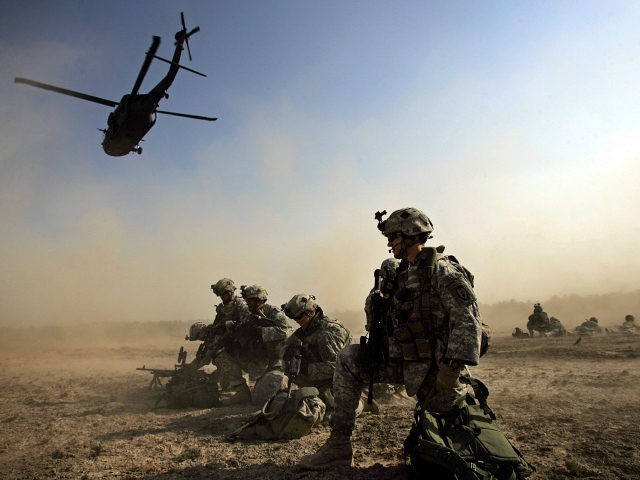WASHINGTON, D.C. — American troops are “in harm’s way” as they collaborate with troops from Iraq, the Kurdish Peshmerga, and Iran-linked Shiite militias in the fight to retake Mosul from the Islamic State (ISIS/ISIL), according to the Pentagon.
On Monday, the Pentagon was asked about the involvement of Shiite militias in the offensive to retake Mosul and whether the U.S. will be supporting those forces.
Peter Cook, the Pentagon’s press secretary, suggested to reporters that the United States will support all troops under the command of Iraqi Prime Minister Haider Abadi, which include the Iran-linked Shiite Popular Mobilization Units (PMU).
Military.com reports:
To defeat the ISIS defenders, the Iraqi Security Forces have assembled 12 U.S.-trained brigades which, combined with Kurdish forces and Shiite Popular Mobilization Units linked to Iran, are expected to make up an attacking force of 20,000 to 30,000…
U.S. military and civilian officials have estimated that ISIS has about 3,000 to 5,000 fighters to defend the city.
Cook told reporters:
We will continue to support Prime Minister Abadi and those forces that are under his command carrying out this important mission.
Cook dismissed concerns about Shiite militias, saying, “It’s been a uniting thing for Iraq. We think that’s a good thing.”
Earlier this year, one of the Iran-backed Shiite militias linked to the PMU threatened the lives of U.S. Marines deployed to Iraq.
American troops may be facing an insider threat posed by the PMU Shiite militias linked to Iran that they are supposed to be collaborating with.
The participation of U.S. advisers as “forward air controllers” on the ground spotting for coalition airstrikes to ensure accuracy, acknowledged yesterday by Army Lt. Gen. Stephen Townsend, commander of the U.S-led war against ISIS in Iraq and Syria, marks the latest departure from Obama’s pledge against having American “boots on the ground.”
With the recent deployment of over 600 troops, the U.S. now has nearly 5,000 forces in Iraq.
Some analysts have voiced concerned that once Mosul is retaken, the Shiite militias will commit atrocities against the Sunni-majority population in the city, as they have done in the past.
The offensive to recapture Mosul, Iraq’s second-largest city and the last major ISIS stronghold in the country, began Monday.
“Some [U.S. troops] will be closer to the front than others… but it’s Iraqis in the lead… Americans are in harm’s way as part of this fight… They’re playing a support role… but they are behind the forward line of troops. ” acknowledged Cook.
“U.S. forces remain in a position to be able to provide advice to them,” he also said. “A small number will be in a position to provide that advice on the ground.”
“It’s fair to say there are Americans on the outskirts of the city,” added the spokesman, without explicitly saying how many U.S. forces are embedded with the advancing forces as advisers and forward air controllers to call in airstrikes.
Army Lt. Gen. Stephen Townsend, commander of U.S.-led war against ISIS in Iraq and Syria, has been granted authority to embed American advisers with friendly forces at the battalion level but so far has “used that very sparingly,” pointed out Cook. “It’s consistent with what we’ve done in the past.”
Referring to the forward air controllers who are embedded with advancing friendly troops on the ground, the Guardian explains:
Those controllers… are the troops on the ground who spot for airstrikes, in an attempt to ensure greater accuracy of aerial bombardment. Their presence indicates that US troops, while not formally in a combat role, are on the frontlines and willing to use substantial airpower on Iraq’s second city.
Qais al-Khazaali, the commander of one of the Shiite militias linked to the PMU, the Asaib Ahl al-Haq (AAH), said has issued heavily sectarian threats, adding that his troops did not need “anyone’s” permission to take part in the fight for Mosul.
As of 2011, the AAH militia had been linked to at least 6,000 attacks against the U.S. military. Earlier this year, the Shiite militia threatened to the lives of some U.S. marines deployed to Iraq.
In a video statement, U.S.-led coalition Commander Townsend said that the operation to recapture Mosul “will likely continue for weeks, possibly longer.”
Besides being embedded with advancing forces, the U.S. military will provide air, artillery, and forward air controller support.
“U.S. AH-64 Apache helicopter gunships are also available for use in the Mosul fight, but Cook said that to his knowledge they had not yet been sent into action and it was unclear whether they would be,” notes Military.com.
U.S.-backed Iraqi troops and their allies reportedly gained ground and made progress on the first day of the offensive, but top American military officers have warned the fight will be difficult.
The U.S. fears ISIS may use chemical weapons, as it has done in the recent past, to defend Mosul.

COMMENTS
Please let us know if you're having issues with commenting.